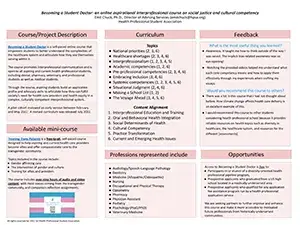Two recently released courses from the Health Professional Student Association (HPSA) have been featured in presentations at national conferences.
A poster presentation on the “Becoming a Student Doctor” course was featured at the Academy of Professionalism in Health Care conference on October 21, 2022. Emil Chuck, Ph.D., Director of Advising Services for the Health Professional Student Association, presented a poster titled “Becoming a Student Doctor: an online aspirational interprofessional course on social justice and cultural competency.” The presentation detailed the course, its curriculum, represented professions, feedback, and opportunities for additional course development. It additionally highlighted HPSA’s free short course, “Treating Trans Patients,” which was developed as an offshoot of the more comprehensive “Becoming a Student Doctor” course.
The initial draft of the curriculum of “Treating Trans Patients” was featured in a presentation given at the Medical Student Pride Alliance virtual conference held in April 2022. The curriculum and content were further developed and refined before its launch in conjunction with Pride month in June 2022.
About the Courses
Becoming a Student Doctor
“Becoming a Student Doctor” is an advanced, six-month, self-paced online course that empowers students to understand the complexities of the healthcare system better and articulate how they see themselves serving within it.
The course promotes interprofessionalism and is open to all aspiring health professional students, including pre-dental, pre-pharmacy, pre-veterinary, and other pre-health students, as well as pre-medical students.
Topics covered in the course include:
· National healthcare priorities
· Healthcare shortages
· Interprofessionalism
· Academic competencies
· Pre-professional competencies
· Embracing inclusion
· Systems competencies
· Situational judgment development
· Making a school list
· The voyage ahead
Treating Trans Patients
The free “Treating Trans Patients” course is available via Google Classroom and contains over nine hours of audio and video content, with the majority of voices coming from the transgender community, along with companion reflection assignments. Topics in the course include:
· Gender-affirming care
· The intersection of gender and culture
· Training for allies and providers
